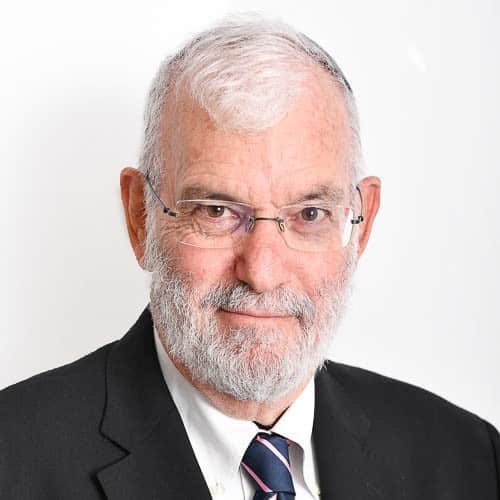Major Gen. (res.) Yaakov Amidror: We need a strong and effective Jordanian regime, that shares in interest for a quiet border with us.
Israel Hayom, 09.02.2020

Maj. Gen. (Res.) Uzi Dayan, once the Deputy Chief of Staff, GOC Central Command and the national security adviser – but even before then, the senior liaison officer to the Jordanian army and head of the defense mission for negotiating the peace deal with Jordan – has a lot of mileage with our neighbors to the East. Dayan remembers one night with the late King Hussein, the father of the current King Abdullah, who told him sincerely: “You think you live in a state surrounded by enemies? We have a bigger problem. We’re a small state surrounded by friends. With them, you have to be even more careful.”
Dayan remembers this moment and the long-lasting cooperation with Jordan, in light of what he calls “intimidations and nightmare scenarios” that some of his colleagues in the defense establishment are spreading, concerning the possibility that Israel will annex the Jordan valley as a “security buffer zone that is essential to Israel,” and that Israel may in the future also allow Jewish prayer on the Temple Mount, inspired by the vague wording that apparently allows it in Trump’s “deal of the century.”
Israel, says Dayan, “Enjoys its relationship with Jordan. The Jordanians enjoy it even more, and that’s an understatement. Those who haven’t internalized this do not know this relationship deeply.” Dayan estimates that “with or without a peace agreement, the Jordanians will think twice before disconnecting from us. Israel is one of Jordan’s vital national interests, its ‘national security card.’ in 1970 Israel put forward an ultimatum to Syria when it planned to invade Jordan, and actually prevented a Palestinian revolution there. That wasn’t the only time we helped the Jordanians preserve the stability of the kingdom.”
Dayan does not elaborate on the security and intelligence cooperation with Jordan, but the archives remember almost everything.
According to foreign media, there is close cooperation between Israel and Jordan on intelligence and security levels, and Israel works to alert Jordan of any subversive elements that allegedly endanger the stability of the Hashemite Kingdom.
The Atlantic reported that the Mossad asked permission from Jordan to attack from its territory chemical weapon sites in Syria, and the foreign press has also alleged that Jordan may even allow Israeli or US planes to pass through it on their way to attack nuclear sites in Iran. Newsweek reported on possible attack scenarios, where one of these options was discussed. The US also has military interests in Jordan.
According to various reports, the Jordanian Army conducts joint exercises with France, Britain and the US.
Dayan notes, still, that the Israeli “insurance” works when it comes to outside threats to Jordan. “It’s difficult to implement it when the threat to the Kingdom comes from within.” And indeed, Jordan is a state with a demographic problem: a Palestinian majority, a strong presence of the Muslim Brotherhood and about 1 million refugees that came from Syria and Iraq, who don’t bring much tranquility to the Kingdom. Jordan’s founders, on which the regime and army stand, the Bedouin tribes originating from the Saudi peninsula, are now a minority in Jordan. This explains the high sensitivity the King has for not only outside threats but also those from within.
But this is precisely why, according to Dayan, that the Jordanians have an interest – unofficially, of course – in an Israeli barrier in the Jordan Valley, between them and the Palestinians in the West Bank. “An Israeli buffer like this, even from their perspective, is helpful and vital for avoiding a connection between the Palestinians in the West Bank with the Palestinians in Jordan – a connection that could increase the threat on the regime.”
Dayan believes therefore that “there is no reason to avoid immediate implementation of Israeli law and administration in the Jordan Valley. From experience, I can say that the peace agreement with Jordan is more stable than how some are trying to portray, and it is a strategic value for both sides, for Jordan even more than Israel. So when it comes to the Valley, one must go as far as one can, if it is good and needed by Israel. Not to be afraid. And the Valley is indeed needed.”
The second land mine in the “deal of the century” concerning Jordan is the clause on the Temple Mount, and the possibility that Jews will be allowed to pray there. Despite the opacity of the plan on this point – on the one hand continuation of the status quo that prohibits Jewish prayer on the Mount, and on the other an unprecedented statement from the US that under certain conditions Jews will be allowed to pray there – the Jordanians are very concerned.
The “deal of the century” safeguards Jordan’s status, which is anchored in the peace agreement with Israel from 1994, as the guardian of the Muslim holy sites in Jerusalem, and also its covert cooperation with Israel in managing the Temple Mount. However, the possibility that Jews will pray there contradicts, according to Jordan, the agreement reached between the US, Jordan and Israel in 2015, where the informal status quo since the Six Day War was put on paper, which said that Jews could visit the Mount but not pray there.
Dayan suggests “taking the opportunity that the “deal of the century” gives us also on Temple Mount, and immediately adopting the principle that would allow Jewish prayer there, but implement it only in the future and in coordination with the Jordanians. I was Commander of the Central Command. There is an arrangement in the Tomb of the Patriarchs that allows for both Jews and Muslims to pray there. Something similar to that can be done on Temple Mount. It must be done with sensitivity, but eventually it must be done. Because, it can not be that a resident of Wadi Ara can practice his freedom of religion on the Temple Mount, but a Jew from Jerusalem can not.”
Q: What would you do immediately?
“I would open the Mount to tourism of all kinds, “civilianize” it, allow school visits, soldiers, students. Does it seem logical to you that on Independence Day Jews can’t pray Hallel there? Or that today Jewish visitors on the Mount can’t drink from the faucets there from ‘fear’ that they will first bless the water? Therefore, changing the status quo on the Mount, which the “deal of the century” opens the door to, does not seem to me to be illogical at all. It only has to be done with maximum sensitivity and coordination.”
One with opposing views to Dayan’s on the Jordanian issue is Major Gen. (res.) Yaakov Amidror, also a former head of The National Security Council, who was also the head of the Research Department of Israeli military intelligence, and military secretary of the Defense Minister. Amidror asks to remind of a few “basic truths concerning our relations with Jordan”: “The border with it is the longest and most quiet that the State of Israel has. Any change in the Kingdom could destabilize that quiet, which should not be taken for granted. Jordan, simply by its existence, acts as a barrier between us and trouble from the East: Iraq, the Iranians in Iraq, Syria and ISIS. If Jordan turns into a bridge state that has no interest in a quiet border with Israel – all that trouble will flow our way. Therefore we need a strong and effective Jordanian regime, that shares in interest for a quiet border with us.”
Amidror claims that “the legitimacy of the Hashemite regime relies also on succeeding to represent not only the narrow interests of the Bedouin tribes, but also the wider interests of the whole population, which is mostly Palestinian. Its legitimacy is also grounded in the fact that the Hashemite house is the only family amongst the Arab rulers that descends directly from Mohammad; the only family that still has a role in a list of traditional roles the family had that were taken by the Saudis – the role of guarding the third holiest site to Islam – Al–Haram al–Sharif, the Temple Mount.
“Given these circumstances, and seeing as how Jordan is a barrier between us and hostile elements and particularly manages to block terror along our border with her saves us blood, literally,” explains Amidror, “we need to do everything to strengthen the regime there and not weaken it. Trump’s plan was revealed, and now we need to decide if we alienate the Jordanian regime, which works according to its own interests as well, in order to achieve things that are important for us.”
Amidror believes that “implementing Israeli law in the Valley will provoke the Jordanians, by saying they will not be allowed to claim that they agreed to it, and will have to do something to show their people on the streets that they are not ignoring it. Those people could endanger the stability of the regime there. Our policy makers need to ask themselves how important it is for us to implement sovereignty in the Valley now and how important it is to keep now – and in general – stability in Jordan, which is a vital interest for us. They should decide now what is more important and urgent.”
‘Changes on the Mount can’t be dealt with’
Concerning the Temple Mount, Amidror is even more determined. “This issue deals with the basis of legitimacy of the Jordanina regime” he clarifies. “If we realize our right to prayer there, as the “deal of the century” suggests, the basis of the legitimacy for the Jordanian regime will be harmed. As a professional, I can say that from a Jordanian standpoint – Jewish prayer on the Temple Mount is a very grave incident, and they will have to respond.”
“If the Jordanians on one hand reach the conclusion that as a result of Jewish prayer on the Mount they are on the verge of losing legitimacy for their rule, they will not hesitate to give up on the security cooperation with us. They may be able to deal with annexing the Jordan Valley; but not with changes on The Temple Mount.”
The complex ties with Jordan and the dilemmas that the “deal of the century” provide are accompanied by a rift in economic ties between the two countries. The opening points of the Jordanian economy are bad: the natural resources and other sources of income are scant. Unemployment is high – 18%, and amongst youth much higher – 42%.
The deficit in the Jordanian budget is 40 billion shekels, and the aid from the US and Gulf states is a few billion a year. Jordan exports to Israel 5 percent of its annual export, but the large projects they share, the ones that are anchored in the understandings and international agreements – are stuck.
The Two Seas Canal, which is supposed to transfer water from the Red Sea to the Dead Sea to save it from disappearing and also irrigate Jordan and the Arava – is not moving forward. The Jordanians blame Israel for the delays. A year and a half ago Israel admitted that the economic benefits of the project are in doubt, and they have shown much bitterness about it. But Jordan, who suffers from a severe water shortage, cares less about these Israeli calculations. Agreements must be honored, they claim, and the Americans are backing them up.
Jared Kushner, Jason Greenblatt and the US Ambassador in Israel David Friedman discussed the canal issue with PM Benjamin Netanyahu. Regional Cooperation Minister Tzachi Hanegbi tried to advance concrete decisions in government. But the prolonged election season keeps things at bay, and the attorney general’s guidelines for elections keep it from moving forward.
These instructions also blocked proceeding with the “bubble”, which was supposed to be a joint industrial area that would be a free trade zone between Israel and Jordan, near the kibbutz of Tirat Zvi. On the Jordanian side the project is moving ahead; on the Israeli side things are slower, since the access road to the Israeli half of the project has not been paved yet. In this case, as well, the political stalemate is delaying any kind of progress.
However, the large scale natural gas deal between Israel and Jordan has apparently jumped over most of the hurdles on the Jordanian side. The agreement calls for 15 years of supplying gas to the Jordanian electric company (40% of its energy consumption), with Israel and the Leviathan natural gas site pocketing 10 billion shekels.
King Abdullah had difficulties approving the agreement, and calls against the deal in the Jordanian parliament were some of the most severe that have been heard regarding the ties with Israel. One member of parliament, Tareq Khouri, even called on Jordanian citizens to blow up the pipelines that would transfer the natural gas from Israel to Jordan. “We will all become martyrs,” he claimed.
Two other issues that are dampening the ties between Israel and Jordan in the last two years is the Jordanian decision not to renew the leases on the territories of Naharayim and Tzofar, and the deadlock in discussions regarding the Gate of Mercy on the Temple Mount, which the Muslims have turned into a mosque. Israel opposes this, but has avoided taking aggressive action to return the situation to what it was before.
Add to this King Abdullah’s alarming statement last November that “the ties between Israel and Jordan now are the worst they have ever been”, and his warning that “implementing sovereignty in the Jordan Valley could harm the peace agreement between Jordan and Israel.”
Major Gen. (res.) Gershon Hacohen, former head of the IDF military colleges and Commander of the Northern Corps and General Staff Corps, calls for treating the advice from some military figures to avoid annexation for now as an intelligence recommendation alone.
“The statesman is the one who makes decisions, intelligence is just a recommendation,” clarifies Hacohen. “What I see is ongoing Jordanian extortion. The Jordanians forced us to remove the metal detectors from the Temple Mount, insulted us in Naharayim and Zofar, and are now audacious enough, after we doubled their water qoutas, to insist on getting water directly from the Sea of Galilee. They refuse to allow us to flow the water down the Jordan River to Naharayim, in order to improve the ecological state of the river, and get the water only in Naharayim.
“We’re working for the Jordanians, the Americans are working for the Jordanians, the Mossad is working for them, and then they even take protection money from us. Where’s the reciprocity? The fee keeps on rising, and we’ve put ourselves in a place that makes it easy to blackmail us. It has to stop,” he said.
As opposed to him, Oded Eran, the former Israeli ambassador to Jordan, reveals a more appeasing attitude towards the Jordanians. In a paper he published recently for the Institute for National Security Studies, Eran claims that “the developments in the Middle East over the past decade have only strengthened the Israeli interest in keeping Jordan stable.”
According to Eran, exactly because “Israel has significant influence on Jordan’s ability to take on the challenges it is dealing with… there needs to be strategic Israeli thinking, together with Israeli and Jordanian readiness to avoid provocative steps – despite internal pressures in both countries”. Eran recommends a comprehensive dialogue on a senior level, whose purpose will be full arrangement of the ties.
by Nadav Shragai, Israel Hayom, 09.02.2020






 - בניית אתרים
- בניית אתרים